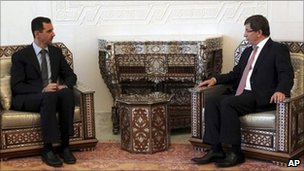 Syrian President Bashar al-Assad has said he will not relent in pursuing "terrorist groups" in the country.
Syrian President Bashar al-Assad has said he will not relent in pursuing "terrorist groups" in the country.
He was speaking after talks with Turkish FM Ahmet Davutoglu, who had urged Syria to end military operations against civilian demonstrators.
Security forces meanwhile continued the crackdown, and reports say nearly 30 more people were killed.
More than 1,700 civilians are believed to have been killed since the uprising began in mid-March.
Tens of thousands of people have reportedly been arrested.
Meanwhile, the United States is reported to be preparing to impose new sanctions on the Assad regime.
The US would target "major elements of Syria's financial and commercial infrastructure that are providing critical support to the regime," a US official said.
'Concrete steps'
Mr Assad's comments came after the meeting with Mr Davutoglu in Damascus on Tuesday.
The official Syrian account of their talks quoted Mr Assad as saying security forces would "not relent in pursuing terrorist groups" to ensure the stability of the nation and the safety of its citizens.
The president also insisted he was serious about a proposed reform programme.
The Syrians quoted Mr Davutoglu as saying he was not carrying a message from anyone, and that Syria would be an example to the whole region once Mr Assad's reforms were enacted.
In his turn, Mr Davutoglu, who had helped improve ties between Ankara and Damascus, said the pair discussed "concrete steps" for Damascus to halt the killing of civilians.
Speaking to reporters on his return to Ankara, he described the methods used by the Syrian security forces as "unacceptable" and outlined actions that Syria had to take to stop the bloodshed.
"We discussed ways to prevent confrontation between the army and the people, and tensions like those in (the central city of) Hama, in the most open and clear way," he said.
"The coming days will be important to see if the expectations are being met. We hope that internal peace and calm is achieved and steps for reform are taken."
Ambassadors recalled
Ahead of his visit, Turkey's top diplomat had been told by Prime Minister Recep Tayyip Erdogan to pass on a "tough" message, demanding an end to Syria's military operations against civilian demonstrators.
Over the weekend, Mr Erdogan said not only that he had "run out of patience", but also that from Turkey's point of view the Syrian crisis was almost an internal problem - their shared border is more than 800km (500 miles) long, says the BBC's Jonathan Head in Istanbul.
Many Turks sympathise with anti-government protesters in Syria and there is burning anger at what is happening, our correspondent says.
Since Saturday, Saudi Arabia, Bahrain and Kuwait have recalled their ambassadors and demanded an immediate end to the use of military force against civilians.
Envoys from India, Brazil and South Africa are also due in Damascus this week to appeal for an end to the killing of protesters.
Efforts to persuade Syria's government to halt the crackdown have had little effect in the past week, during which more than 300 civilians are believed to have been killed, including at least 14 on Monday.
On Tuesday, at least seven people were killed when troops backed by tanks and armoured vehicles overran towns and villages outside Hama, including Soran, Halfaya and Taybat al-Imam, where snipers have been deployed on roofs.
Two sisters aged six and 11 were reportedly among the five dead brought to a hospital in Taybat al-Imam, while the Syrian National Organisation for Human Rights told Reuters news agency that at least 26 people had died.
Two people were also killed in the centre of Hama, activists said.
At least three others were reportedly killed in the town of Binnish, in Idlib governorate, about 30km (19 miles) from the border with Turkey, in a similar attack.
Asked why Binnish was stormed, a resident who had fled told Reuters: "The whole town has been joining in night rallies after Ramadan prayers."
The army also continued its operation to crush dissent in the eastern city of Deir al-Zour, where more than 60 civilians are said to have been killed since Sunday.
The Local Co-ordination Committees, an activist group that organises and documents the protests, said that more than 200 tanks had been deployed in the centre, and that security forces were carrying out raids and detaining residents.
Deaths were also reported in Homs and the Damascus suburb of Irbin.
Access to Syria has been severely restricted for international journalists, and it is rarely possible to verify accounts by witnesses and activists.



